University Law Assignment: Corporate Law Case Analysis - KTS
VerifiedAdded on 2020/03/16
|7
|1939
|56
Case Study
AI Summary
This case study analyzes two key issues in corporate law. The first issue concerns whether a car finance company can enforce a mortgage over an office building owned by Kakadu Tourism Services Pty Ltd (KTS), where the mortgage was executed by John for his personal use and not for the company's benefit. The analysis examines the application of section 126 and 127 of the Corporations Act regarding valid contract execution and director authority. The second issue addresses whether Easy Loan Bank can enforce a mortgage over a house owned by the company, given that John took a loan without informing Mary (a director) and misrepresented the company's internal structure to the bank. This part analyzes the application of section 129 and 128(3) of the Corporations Act, focusing on the indoor management rule and the assumptions that outsiders can make about director authority, even in cases of fraud or misrepresentation. The conclusion determines the validity of the mortgages and the bank's ability to enforce them.

1
Topic:
Student Name:
University:
Topic:
Student Name:
University:
Paraphrase This Document
Need a fresh take? Get an instant paraphrase of this document with our AI Paraphraser
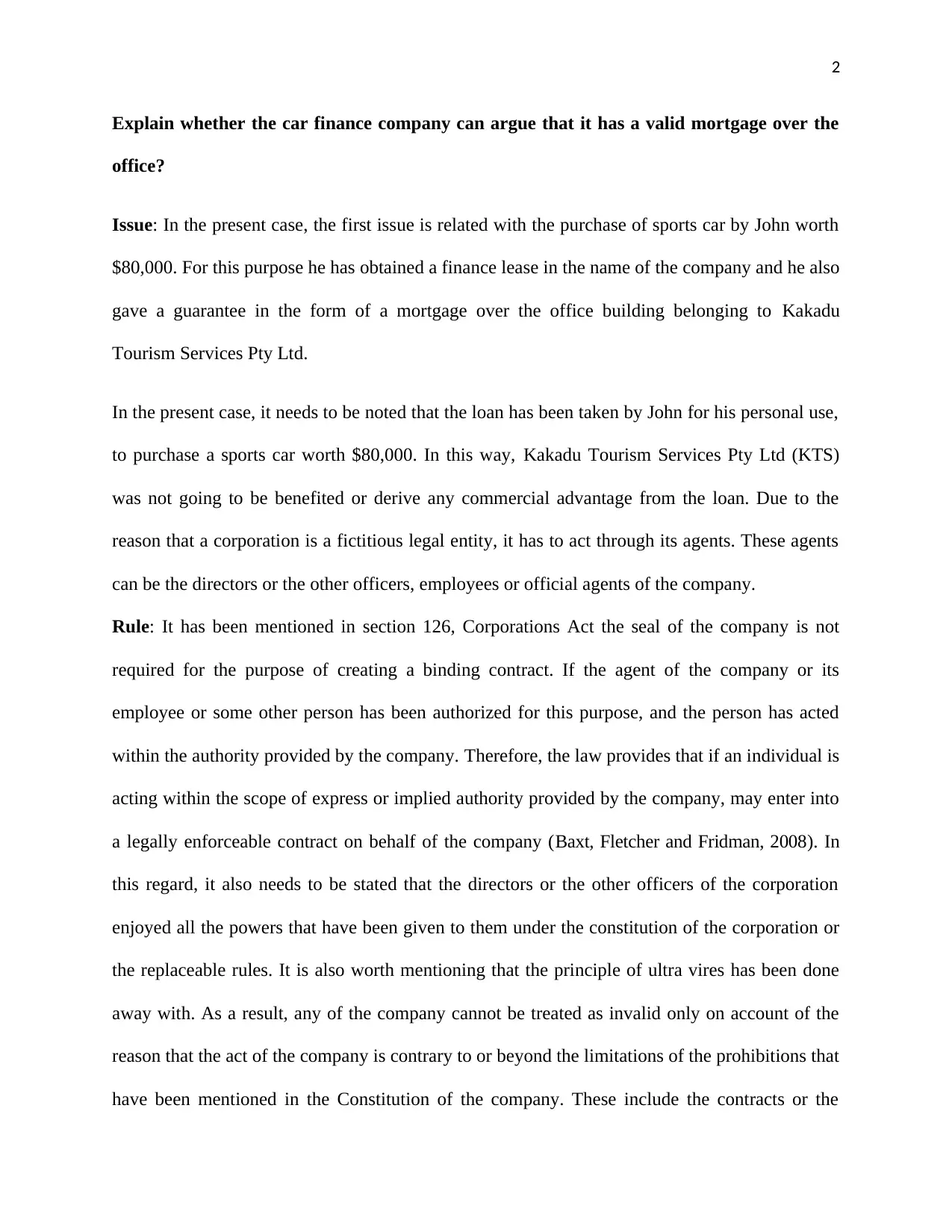
2
Explain whether the car finance company can argue that it has a valid mortgage over the
office?
Issue: In the present case, the first issue is related with the purchase of sports car by John worth
$80,000. For this purpose he has obtained a finance lease in the name of the company and he also
gave a guarantee in the form of a mortgage over the office building belonging to Kakadu
Tourism Services Pty Ltd.
In the present case, it needs to be noted that the loan has been taken by John for his personal use,
to purchase a sports car worth $80,000. In this way, Kakadu Tourism Services Pty Ltd (KTS)
was not going to be benefited or derive any commercial advantage from the loan. Due to the
reason that a corporation is a fictitious legal entity, it has to act through its agents. These agents
can be the directors or the other officers, employees or official agents of the company.
Rule: It has been mentioned in section 126, Corporations Act the seal of the company is not
required for the purpose of creating a binding contract. If the agent of the company or its
employee or some other person has been authorized for this purpose, and the person has acted
within the authority provided by the company. Therefore, the law provides that if an individual is
acting within the scope of express or implied authority provided by the company, may enter into
a legally enforceable contract on behalf of the company (Baxt, Fletcher and Fridman, 2008). In
this regard, it also needs to be stated that the directors or the other officers of the corporation
enjoyed all the powers that have been given to them under the constitution of the corporation or
the replaceable rules. It is also worth mentioning that the principle of ultra vires has been done
away with. As a result, any of the company cannot be treated as invalid only on account of the
reason that the act of the company is contrary to or beyond the limitations of the prohibitions that
have been mentioned in the Constitution of the company. These include the contracts or the
Explain whether the car finance company can argue that it has a valid mortgage over the
office?
Issue: In the present case, the first issue is related with the purchase of sports car by John worth
$80,000. For this purpose he has obtained a finance lease in the name of the company and he also
gave a guarantee in the form of a mortgage over the office building belonging to Kakadu
Tourism Services Pty Ltd.
In the present case, it needs to be noted that the loan has been taken by John for his personal use,
to purchase a sports car worth $80,000. In this way, Kakadu Tourism Services Pty Ltd (KTS)
was not going to be benefited or derive any commercial advantage from the loan. Due to the
reason that a corporation is a fictitious legal entity, it has to act through its agents. These agents
can be the directors or the other officers, employees or official agents of the company.
Rule: It has been mentioned in section 126, Corporations Act the seal of the company is not
required for the purpose of creating a binding contract. If the agent of the company or its
employee or some other person has been authorized for this purpose, and the person has acted
within the authority provided by the company. Therefore, the law provides that if an individual is
acting within the scope of express or implied authority provided by the company, may enter into
a legally enforceable contract on behalf of the company (Baxt, Fletcher and Fridman, 2008). In
this regard, it also needs to be stated that the directors or the other officers of the corporation
enjoyed all the powers that have been given to them under the constitution of the corporation or
the replaceable rules. It is also worth mentioning that the principle of ultra vires has been done
away with. As a result, any of the company cannot be treated as invalid only on account of the
reason that the act of the company is contrary to or beyond the limitations of the prohibitions that
have been mentioned in the Constitution of the company. These include the contracts or the
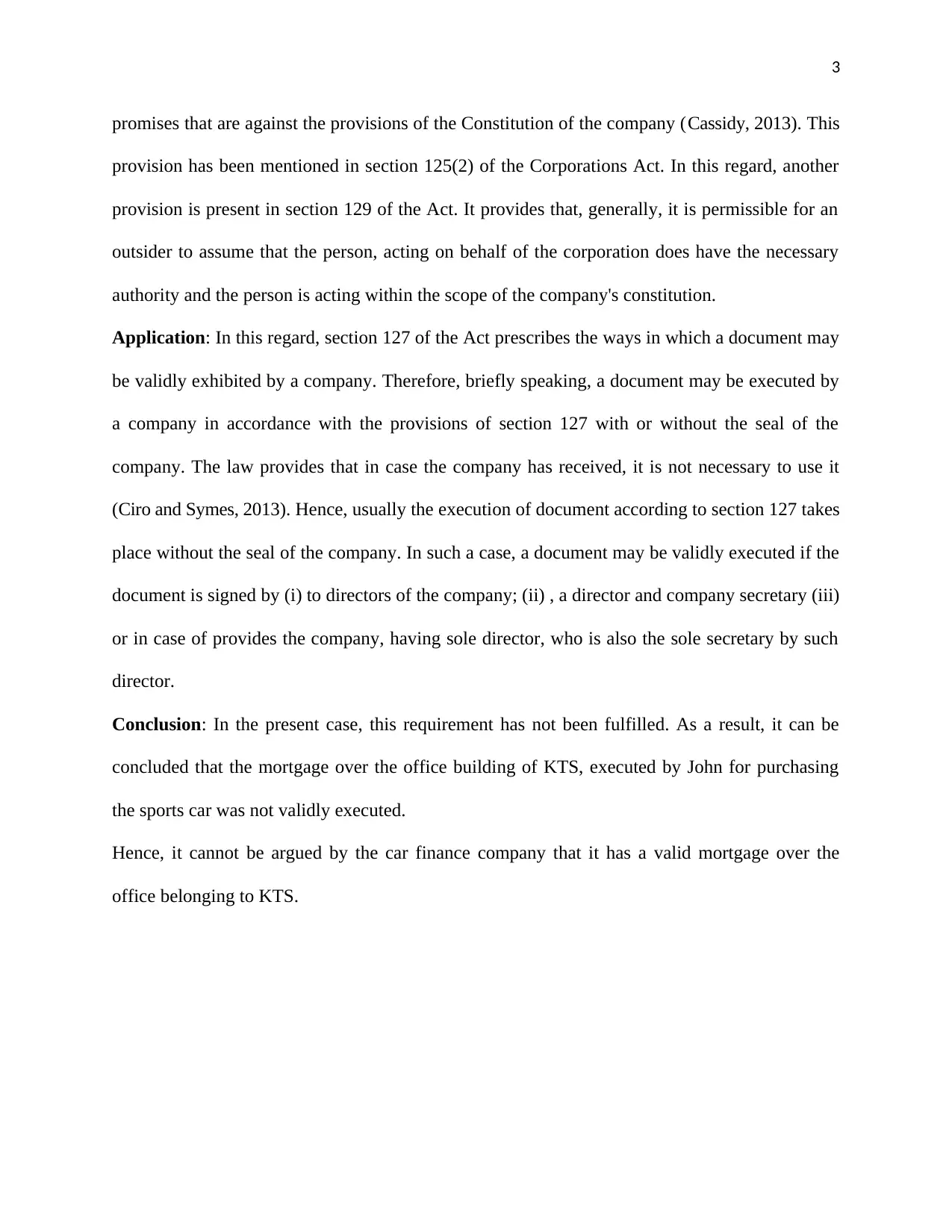
3
promises that are against the provisions of the Constitution of the company (Cassidy, 2013). This
provision has been mentioned in section 125(2) of the Corporations Act. In this regard, another
provision is present in section 129 of the Act. It provides that, generally, it is permissible for an
outsider to assume that the person, acting on behalf of the corporation does have the necessary
authority and the person is acting within the scope of the company's constitution.
Application: In this regard, section 127 of the Act prescribes the ways in which a document may
be validly exhibited by a company. Therefore, briefly speaking, a document may be executed by
a company in accordance with the provisions of section 127 with or without the seal of the
company. The law provides that in case the company has received, it is not necessary to use it
(Ciro and Symes, 2013). Hence, usually the execution of document according to section 127 takes
place without the seal of the company. In such a case, a document may be validly executed if the
document is signed by (i) to directors of the company; (ii) , a director and company secretary (iii)
or in case of provides the company, having sole director, who is also the sole secretary by such
director.
Conclusion: In the present case, this requirement has not been fulfilled. As a result, it can be
concluded that the mortgage over the office building of KTS, executed by John for purchasing
the sports car was not validly executed.
Hence, it cannot be argued by the car finance company that it has a valid mortgage over the
office belonging to KTS.
promises that are against the provisions of the Constitution of the company (Cassidy, 2013). This
provision has been mentioned in section 125(2) of the Corporations Act. In this regard, another
provision is present in section 129 of the Act. It provides that, generally, it is permissible for an
outsider to assume that the person, acting on behalf of the corporation does have the necessary
authority and the person is acting within the scope of the company's constitution.
Application: In this regard, section 127 of the Act prescribes the ways in which a document may
be validly exhibited by a company. Therefore, briefly speaking, a document may be executed by
a company in accordance with the provisions of section 127 with or without the seal of the
company. The law provides that in case the company has received, it is not necessary to use it
(Ciro and Symes, 2013). Hence, usually the execution of document according to section 127 takes
place without the seal of the company. In such a case, a document may be validly executed if the
document is signed by (i) to directors of the company; (ii) , a director and company secretary (iii)
or in case of provides the company, having sole director, who is also the sole secretary by such
director.
Conclusion: In the present case, this requirement has not been fulfilled. As a result, it can be
concluded that the mortgage over the office building of KTS, executed by John for purchasing
the sports car was not validly executed.
Hence, it cannot be argued by the car finance company that it has a valid mortgage over the
office belonging to KTS.
⊘ This is a preview!⊘
Do you want full access?
Subscribe today to unlock all pages.

Trusted by 1+ million students worldwide
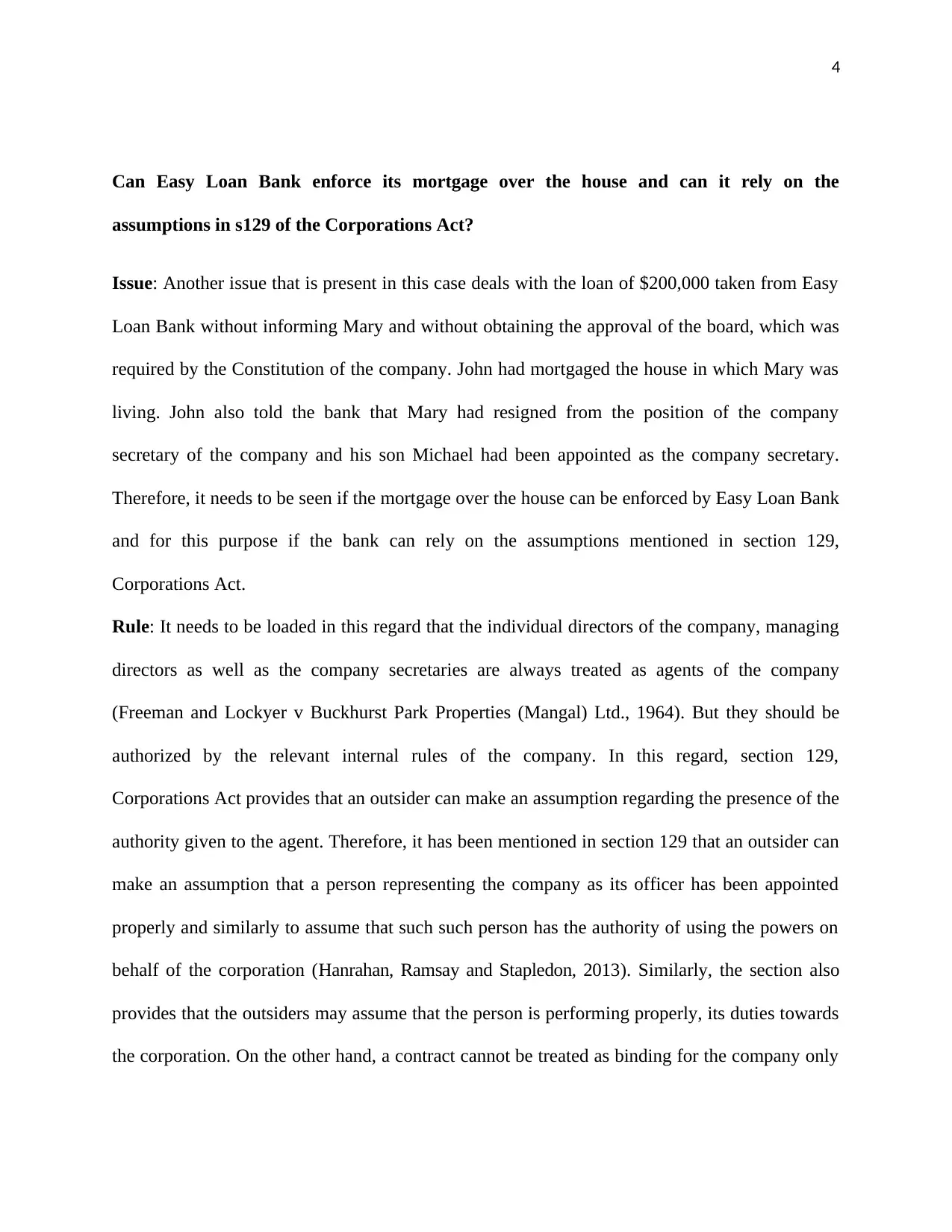
4
Can Easy Loan Bank enforce its mortgage over the house and can it rely on the
assumptions in s129 of the Corporations Act?
Issue: Another issue that is present in this case deals with the loan of $200,000 taken from Easy
Loan Bank without informing Mary and without obtaining the approval of the board, which was
required by the Constitution of the company. John had mortgaged the house in which Mary was
living. John also told the bank that Mary had resigned from the position of the company
secretary of the company and his son Michael had been appointed as the company secretary.
Therefore, it needs to be seen if the mortgage over the house can be enforced by Easy Loan Bank
and for this purpose if the bank can rely on the assumptions mentioned in section 129,
Corporations Act.
Rule: It needs to be loaded in this regard that the individual directors of the company, managing
directors as well as the company secretaries are always treated as agents of the company
(Freeman and Lockyer v Buckhurst Park Properties (Mangal) Ltd., 1964). But they should be
authorized by the relevant internal rules of the company. In this regard, section 129,
Corporations Act provides that an outsider can make an assumption regarding the presence of the
authority given to the agent. Therefore, it has been mentioned in section 129 that an outsider can
make an assumption that a person representing the company as its officer has been appointed
properly and similarly to assume that such such person has the authority of using the powers on
behalf of the corporation (Hanrahan, Ramsay and Stapledon, 2013). Similarly, the section also
provides that the outsiders may assume that the person is performing properly, its duties towards
the corporation. On the other hand, a contract cannot be treated as binding for the company only
Can Easy Loan Bank enforce its mortgage over the house and can it rely on the
assumptions in s129 of the Corporations Act?
Issue: Another issue that is present in this case deals with the loan of $200,000 taken from Easy
Loan Bank without informing Mary and without obtaining the approval of the board, which was
required by the Constitution of the company. John had mortgaged the house in which Mary was
living. John also told the bank that Mary had resigned from the position of the company
secretary of the company and his son Michael had been appointed as the company secretary.
Therefore, it needs to be seen if the mortgage over the house can be enforced by Easy Loan Bank
and for this purpose if the bank can rely on the assumptions mentioned in section 129,
Corporations Act.
Rule: It needs to be loaded in this regard that the individual directors of the company, managing
directors as well as the company secretaries are always treated as agents of the company
(Freeman and Lockyer v Buckhurst Park Properties (Mangal) Ltd., 1964). But they should be
authorized by the relevant internal rules of the company. In this regard, section 129,
Corporations Act provides that an outsider can make an assumption regarding the presence of the
authority given to the agent. Therefore, it has been mentioned in section 129 that an outsider can
make an assumption that a person representing the company as its officer has been appointed
properly and similarly to assume that such such person has the authority of using the powers on
behalf of the corporation (Hanrahan, Ramsay and Stapledon, 2013). Similarly, the section also
provides that the outsiders may assume that the person is performing properly, its duties towards
the corporation. On the other hand, a contract cannot be treated as binding for the company only
Paraphrase This Document
Need a fresh take? Get an instant paraphrase of this document with our AI Paraphraser
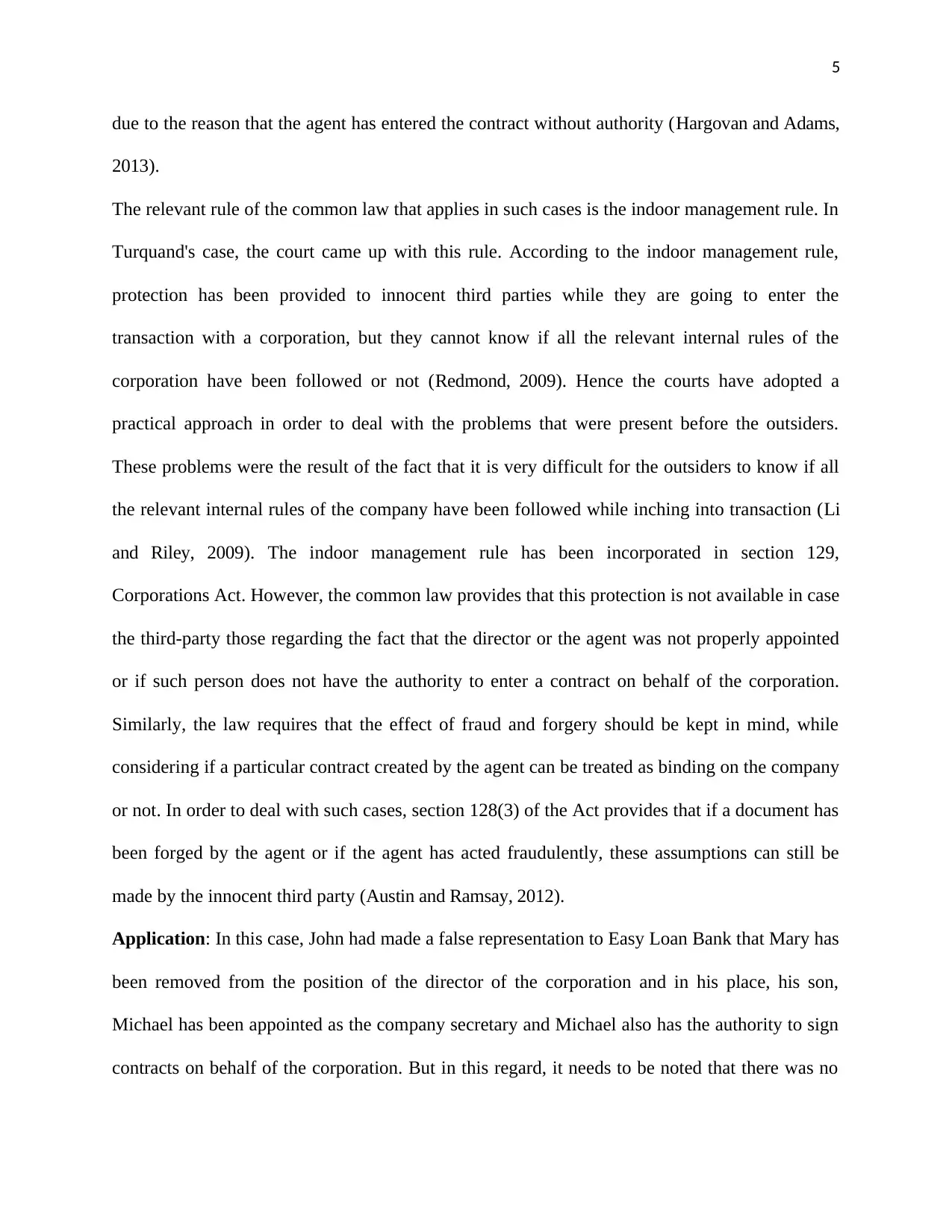
5
due to the reason that the agent has entered the contract without authority (Hargovan and Adams,
2013).
The relevant rule of the common law that applies in such cases is the indoor management rule. In
Turquand's case, the court came up with this rule. According to the indoor management rule,
protection has been provided to innocent third parties while they are going to enter the
transaction with a corporation, but they cannot know if all the relevant internal rules of the
corporation have been followed or not (Redmond, 2009). Hence the courts have adopted a
practical approach in order to deal with the problems that were present before the outsiders.
These problems were the result of the fact that it is very difficult for the outsiders to know if all
the relevant internal rules of the company have been followed while inching into transaction (Li
and Riley, 2009). The indoor management rule has been incorporated in section 129,
Corporations Act. However, the common law provides that this protection is not available in case
the third-party those regarding the fact that the director or the agent was not properly appointed
or if such person does not have the authority to enter a contract on behalf of the corporation.
Similarly, the law requires that the effect of fraud and forgery should be kept in mind, while
considering if a particular contract created by the agent can be treated as binding on the company
or not. In order to deal with such cases, section 128(3) of the Act provides that if a document has
been forged by the agent or if the agent has acted fraudulently, these assumptions can still be
made by the innocent third party (Austin and Ramsay, 2012).
Application: In this case, John had made a false representation to Easy Loan Bank that Mary has
been removed from the position of the director of the corporation and in his place, his son,
Michael has been appointed as the company secretary and Michael also has the authority to sign
contracts on behalf of the corporation. But in this regard, it needs to be noted that there was no
due to the reason that the agent has entered the contract without authority (Hargovan and Adams,
2013).
The relevant rule of the common law that applies in such cases is the indoor management rule. In
Turquand's case, the court came up with this rule. According to the indoor management rule,
protection has been provided to innocent third parties while they are going to enter the
transaction with a corporation, but they cannot know if all the relevant internal rules of the
corporation have been followed or not (Redmond, 2009). Hence the courts have adopted a
practical approach in order to deal with the problems that were present before the outsiders.
These problems were the result of the fact that it is very difficult for the outsiders to know if all
the relevant internal rules of the company have been followed while inching into transaction (Li
and Riley, 2009). The indoor management rule has been incorporated in section 129,
Corporations Act. However, the common law provides that this protection is not available in case
the third-party those regarding the fact that the director or the agent was not properly appointed
or if such person does not have the authority to enter a contract on behalf of the corporation.
Similarly, the law requires that the effect of fraud and forgery should be kept in mind, while
considering if a particular contract created by the agent can be treated as binding on the company
or not. In order to deal with such cases, section 128(3) of the Act provides that if a document has
been forged by the agent or if the agent has acted fraudulently, these assumptions can still be
made by the innocent third party (Austin and Ramsay, 2012).
Application: In this case, John had made a false representation to Easy Loan Bank that Mary has
been removed from the position of the director of the corporation and in his place, his son,
Michael has been appointed as the company secretary and Michael also has the authority to sign
contracts on behalf of the corporation. But in this regard, it needs to be noted that there was no
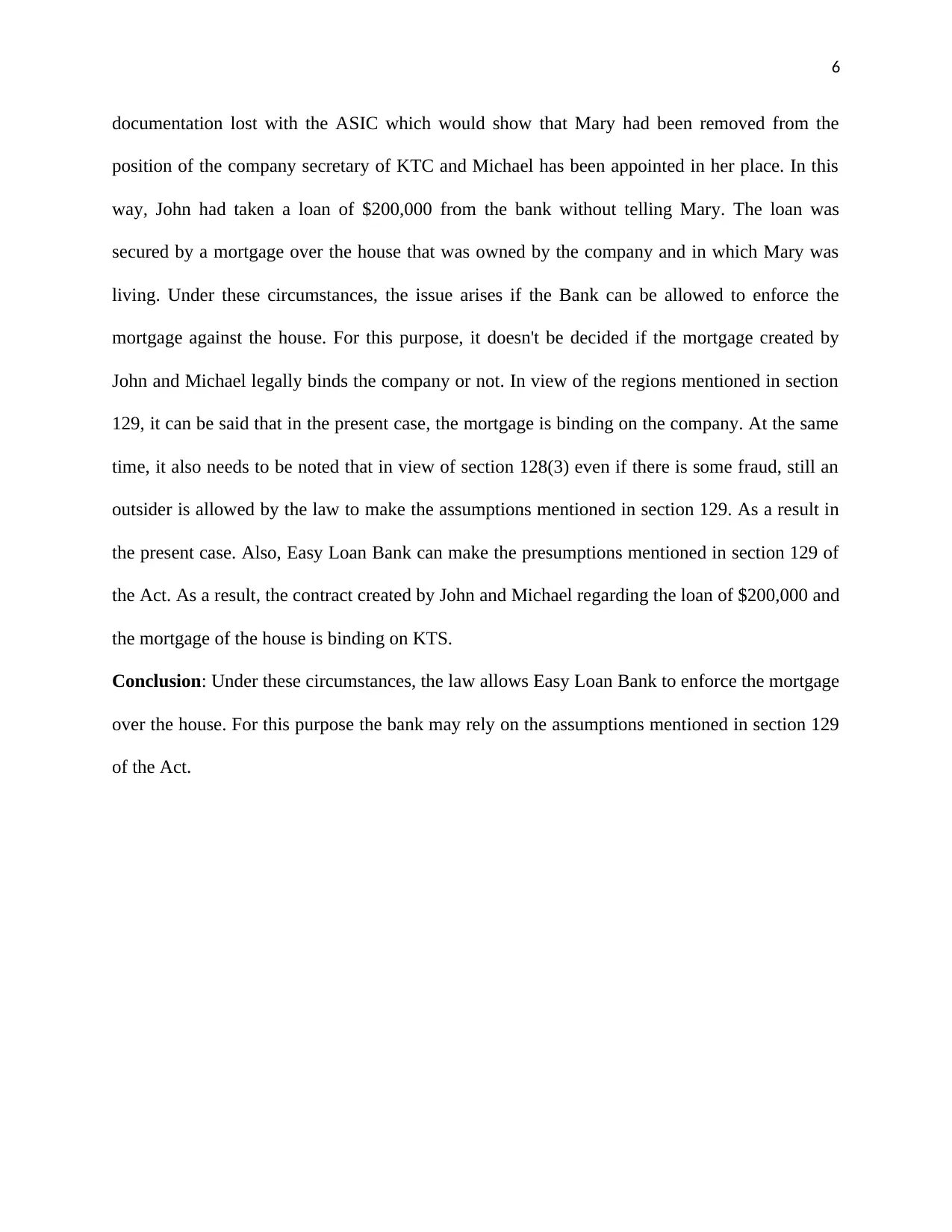
6
documentation lost with the ASIC which would show that Mary had been removed from the
position of the company secretary of KTC and Michael has been appointed in her place. In this
way, John had taken a loan of $200,000 from the bank without telling Mary. The loan was
secured by a mortgage over the house that was owned by the company and in which Mary was
living. Under these circumstances, the issue arises if the Bank can be allowed to enforce the
mortgage against the house. For this purpose, it doesn't be decided if the mortgage created by
John and Michael legally binds the company or not. In view of the regions mentioned in section
129, it can be said that in the present case, the mortgage is binding on the company. At the same
time, it also needs to be noted that in view of section 128(3) even if there is some fraud, still an
outsider is allowed by the law to make the assumptions mentioned in section 129. As a result in
the present case. Also, Easy Loan Bank can make the presumptions mentioned in section 129 of
the Act. As a result, the contract created by John and Michael regarding the loan of $200,000 and
the mortgage of the house is binding on KTS.
Conclusion: Under these circumstances, the law allows Easy Loan Bank to enforce the mortgage
over the house. For this purpose the bank may rely on the assumptions mentioned in section 129
of the Act.
documentation lost with the ASIC which would show that Mary had been removed from the
position of the company secretary of KTC and Michael has been appointed in her place. In this
way, John had taken a loan of $200,000 from the bank without telling Mary. The loan was
secured by a mortgage over the house that was owned by the company and in which Mary was
living. Under these circumstances, the issue arises if the Bank can be allowed to enforce the
mortgage against the house. For this purpose, it doesn't be decided if the mortgage created by
John and Michael legally binds the company or not. In view of the regions mentioned in section
129, it can be said that in the present case, the mortgage is binding on the company. At the same
time, it also needs to be noted that in view of section 128(3) even if there is some fraud, still an
outsider is allowed by the law to make the assumptions mentioned in section 129. As a result in
the present case. Also, Easy Loan Bank can make the presumptions mentioned in section 129 of
the Act. As a result, the contract created by John and Michael regarding the loan of $200,000 and
the mortgage of the house is binding on KTS.
Conclusion: Under these circumstances, the law allows Easy Loan Bank to enforce the mortgage
over the house. For this purpose the bank may rely on the assumptions mentioned in section 129
of the Act.
⊘ This is a preview!⊘
Do you want full access?
Subscribe today to unlock all pages.

Trusted by 1+ million students worldwide
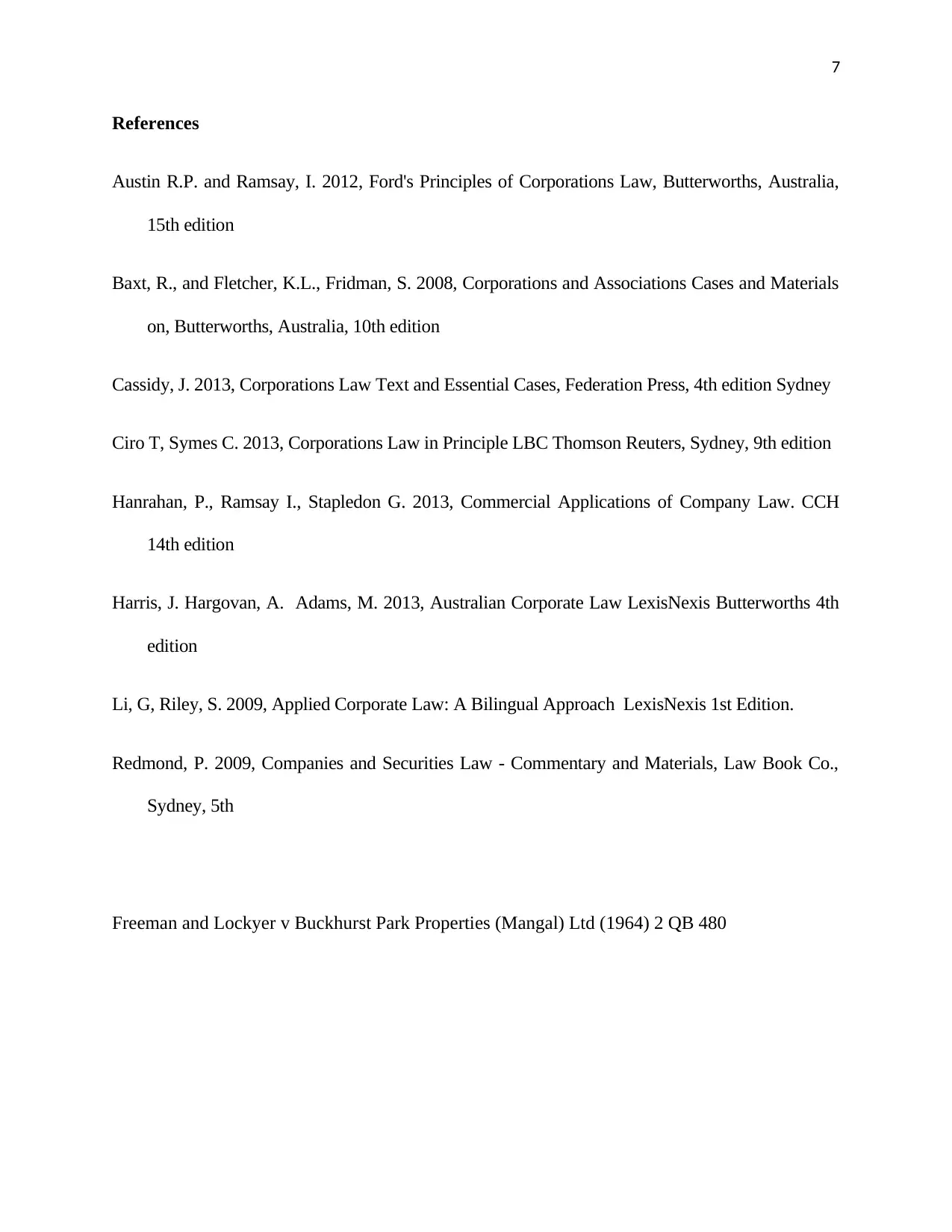
7
References
Austin R.P. and Ramsay, I. 2012, Ford's Principles of Corporations Law, Butterworths, Australia,
15th edition
Baxt, R., and Fletcher, K.L., Fridman, S. 2008, Corporations and Associations Cases and Materials
on, Butterworths, Australia, 10th edition
Cassidy, J. 2013, Corporations Law Text and Essential Cases, Federation Press, 4th edition Sydney
Ciro T, Symes C. 2013, Corporations Law in Principle LBC Thomson Reuters, Sydney, 9th edition
Hanrahan, P., Ramsay I., Stapledon G. 2013, Commercial Applications of Company Law. CCH
14th edition
Harris, J. Hargovan, A. Adams, M. 2013, Australian Corporate Law LexisNexis Butterworths 4th
edition
Li, G, Riley, S. 2009, Applied Corporate Law: A Bilingual Approach LexisNexis 1st Edition.
Redmond, P. 2009, Companies and Securities Law - Commentary and Materials, Law Book Co.,
Sydney, 5th
Freeman and Lockyer v Buckhurst Park Properties (Mangal) Ltd (1964) 2 QB 480
References
Austin R.P. and Ramsay, I. 2012, Ford's Principles of Corporations Law, Butterworths, Australia,
15th edition
Baxt, R., and Fletcher, K.L., Fridman, S. 2008, Corporations and Associations Cases and Materials
on, Butterworths, Australia, 10th edition
Cassidy, J. 2013, Corporations Law Text and Essential Cases, Federation Press, 4th edition Sydney
Ciro T, Symes C. 2013, Corporations Law in Principle LBC Thomson Reuters, Sydney, 9th edition
Hanrahan, P., Ramsay I., Stapledon G. 2013, Commercial Applications of Company Law. CCH
14th edition
Harris, J. Hargovan, A. Adams, M. 2013, Australian Corporate Law LexisNexis Butterworths 4th
edition
Li, G, Riley, S. 2009, Applied Corporate Law: A Bilingual Approach LexisNexis 1st Edition.
Redmond, P. 2009, Companies and Securities Law - Commentary and Materials, Law Book Co.,
Sydney, 5th
Freeman and Lockyer v Buckhurst Park Properties (Mangal) Ltd (1964) 2 QB 480
1 out of 7
Related Documents
Your All-in-One AI-Powered Toolkit for Academic Success.
+13062052269
info@desklib.com
Available 24*7 on WhatsApp / Email
![[object Object]](/_next/static/media/star-bottom.7253800d.svg)
Unlock your academic potential
Copyright © 2020–2026 A2Z Services. All Rights Reserved. Developed and managed by ZUCOL.




